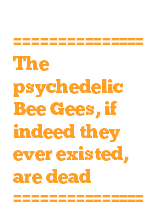The first Bee Gees album which fails to satisfy yet two of their all-time killer songs are to be found here.
Unlike its late 60s counterparts, Idea lacks coherency. 1st fizzes with quirky likeability, Horizontal explores new territories and Odessa luxuriates in ambitious orchestral grandeur. But Idea? Well what was the idea apart from producing another outlet for Bee Gees’ songs? Probably just that. Given the pace at which the brothers were working at the time, it’s not surprising that about half of Idea sounds like set aside material.
Two sided
Idea is an album of two sides in more than just the literal sense.
Side One is largely content to tread water. We have the swooning, overly lush concoction Let There Be Love (though wonderful sostenuto vocals), the folk/country-lite of Kitty Can, a heartfelt though merely pleasant ballad from Robin (In the Summer of His Years – in memory of Brian Epstein) and the enjoyable while it lasts Indian Gin and Whiskey Dry. Down to Earth is hugely promising but criminally under-developed (did David Bowie ever hear it?). Vince gets his sole bite of the cherry on Such a Shame but his guitar and harmonica outing is little more than an enjoyable diversion.
There’s nothing that’s bad here, just little that’s inspiring.
Bright Ideas
But then it all kicks off with the pent-up restlessness of Idea (or the top notch soul of I’ve Gotta Get a Message To You if you’re listening to the US or South African Idea) building to the magisterial humility of I Started a Joke and the dignified finale Swan Song which is Where the Swallows Fly without the hyperbole. Along the way, the understated Kilburn Towers provides a delightfully whimsical digression.
So what you’re left with is the deceptive feeling of a Bee Gees album as good as any other – in fact one which includes two stellar classics in I’ve Gotta get a Message to You and I Started a Joke – because by the album’s close, the far superior second half has so thoroughly eclipsed the memory of the somewhat ordinary first.

Idea [1968]
Side 1
Let There Be Love
Kitty Can
In the Summer of His Years
Indian Gin and Whiskey Dry
Down to Earth
Such a Shame
I’ve Gotta Get a Message To You*
Side 2
Idea
When the Swallows Fly
I Have Decided To Join the Air Force
I Started a Joke
Kilburn Towers
Swan Song
* US/South African LP version only in place of Such a Shame
Singles 1968 [related to Idea]
Jumbo
The Singer Sang His Song
I’ve Gotta Get a Message To You
Kitty Can
I Started a Joke
Kilburn Towers
Unreleased 1968
Chocolate Symphony*
Bridge Crossing Rivers*
Completely Unoriginal*
Come Some Christmas Eve or Halloween*
Gena’s Theme*
Another Cold and Windy Day (Coke Spot #1)*
Sitting in the Meadow (Coke Spot #2)*
* released on Idea Rhino reissue, 2006




 wistful and self-questioning, How Can You Mend… is despairing, imploring, gospel raw, certainly in Al Green’s hands.
wistful and self-questioning, How Can You Mend… is despairing, imploring, gospel raw, certainly in Al Green’s hands. Carnabetian, theatrical, neo-Victorian Englishness (‘sitting eating hot cross buns…’) swapping the latter’s forced merriment for the odd thrown in moment of arch sarcastic disregard (‘thousand suckers every one’.)
Carnabetian, theatrical, neo-Victorian Englishness (‘sitting eating hot cross buns…’) swapping the latter’s forced merriment for the odd thrown in moment of arch sarcastic disregard (‘thousand suckers every one’.)